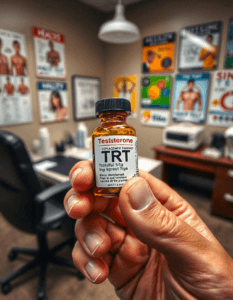
Understanding Testosterone Replacement Therapy (TRT)
What is Testosterone Replacement Therapy?
Testosterone Replacement Therapy (TRT) is a medical treatment used to address testosterone deficiency in individuals who do not produce enough of this hormone naturally. Here’s an overview of TRT, its benefits, considerations, and how it is administered:
How Does Testosterone Replacement Therapy Work?
TRT can be administered through various methods, including:
- Injections: Typically administered every 2-4 weeks, providing a sustained release of testosterone.
- Topical Gels and Creams: Applied daily to the skin, allowing for steady absorption of testosterone.
- Patches: Worn on the skin and replaced daily, releasing testosterone directly into the bloodstream.
- Implants: Pellets inserted under the skin, releasing testosterone gradually over several months.
The choice of method depends on factors such as patient preference, convenience, and healthcare provider recommendation.
Benefits of Testosterone Replacement Therapy:
- Improved Sexual Function: Increases libido (sex drive) and may improve erectile function.
- Increased Muscle Mass and Strength: Helps maintain muscle mass and improve physical performance.
- Enhanced Mood and Well-being: Can alleviate symptoms of fatigue, irritability, and depression associated with low testosterone levels.
- Bone Health: Maintains bone density and reduces the risk of osteoporosis.
Considerations and Risks:
- Monitoring: Regular monitoring by a healthcare provider is essential to adjust dosage and monitor for potential side effects.
- Potential Side Effects: These may include acne, fluid retention, increased risk of cardiovascular events (particularly in older men), and enlargement of the prostate.
- Individualized Treatment: TRT is tailored to each patient’s needs and health status, considering factors such as age, overall health, and the severity of testosterone deficiency.
Testosterone Replacement Therapy (TRT) is a valuable treatment option for individuals with testosterone deficiency, providing significant improvements in quality of life, sexual function, muscle strength, and overall well-being. However, it should be prescribed and monitored by a qualified healthcare provider to ensure safety and effectiveness. If you suspect you have low testosterone levels, consult with a healthcare professional to discuss whether TRT is appropriate for you.


